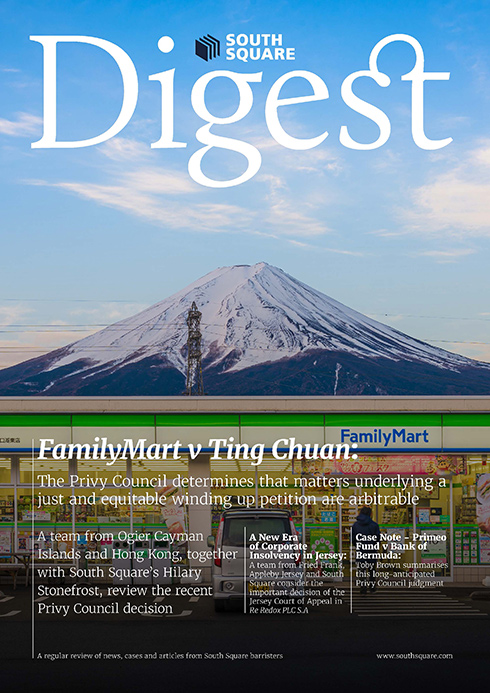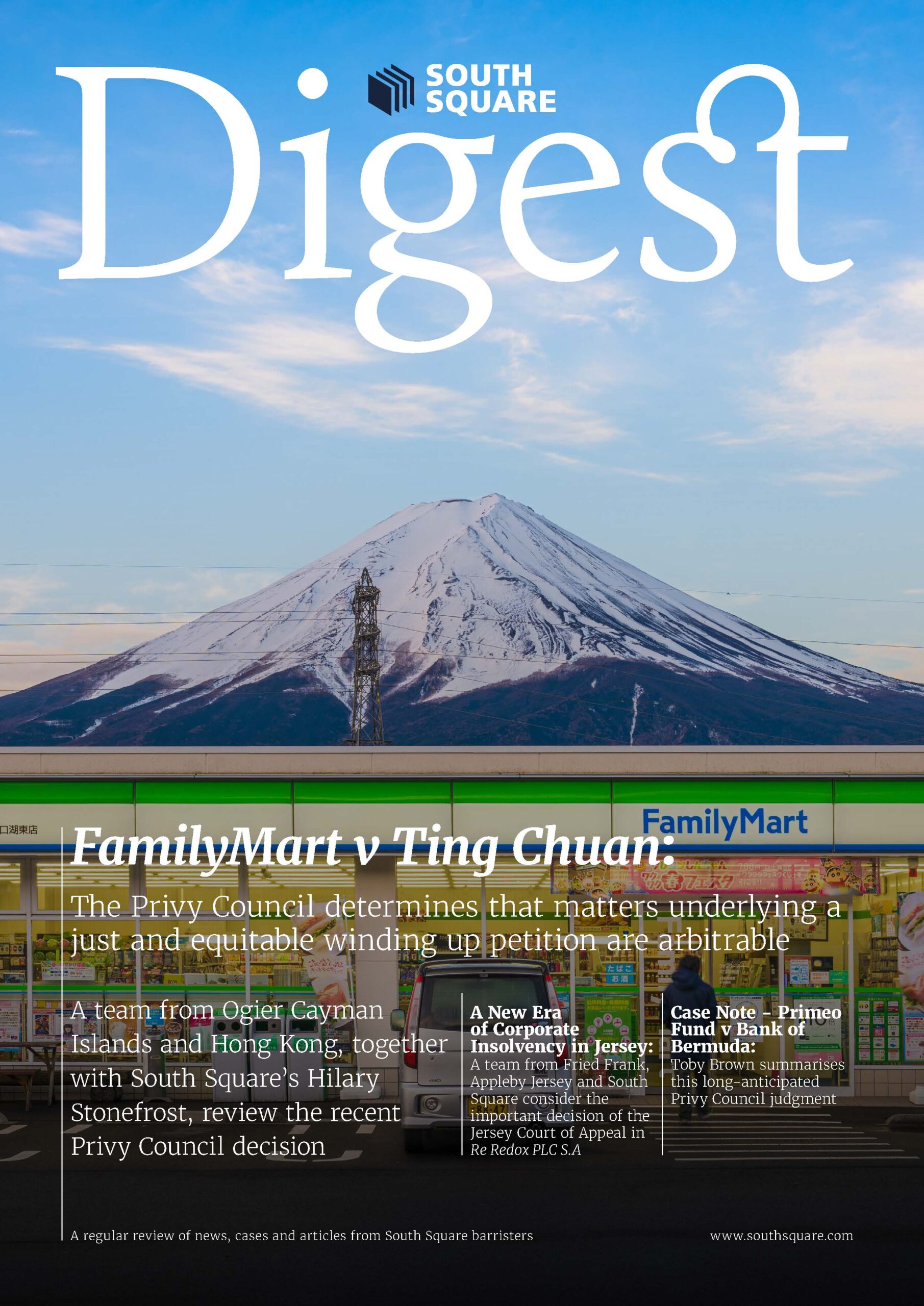

By James Barratt and Ashley Katz of Fried, Frank, Harris, Shriver & Jacobson (London) LLP, Jared Dann and Lara von Wildenrath of Appleby (Jersey) LLP, and Marcus Haywood and Annabelle Wang of South Square.
Introduction
In Re Redox PLC SA,1 the Jersey Court of Appeal has considered the new creditor-led winding up procedure introduced in Jersey under the Companies (Amendment No 8) (Jersey) Regulations 2022 (the “Regulations”) for the first time, in a significant decision which is likely to have important ramifications for Jersey insolvency law and practice.
Prior to the introduction of the creditors’ winding up by the Regulations, the only corporate insolvency process available to creditors (as opposed to the company or its members) under Jersey law was the désastre, which vested the assets of the company in the Viscount (the executive officer of the Court).
As the President explained in his judgment in Redox:2
“What that law did not contain was any procedure equivalent to a creditors’ compulsory winding up petition and order in the UK. Instead, the functionally equivalent process was one of Jersey’s indigenous insolvency procedures, namely désastre, now regulated under the Bankruptcy (Désastre) (Jersey) Law 1990 (the “1990 Law”). If the court made the appropriate declaration, this placed the administration of the company’s assets and liabilities in the hands of the Viscount, the executive officer of the Royal Court, but there was no separate liquidator. This procedure did not provide for insolvency to be established by failure to pay a statutory demand, the application was made ex parte rather than inter partes, and the court appeared to enjoy a wide discretion as to whether or not to make the order sought.”
In March 2022, the legislature introduced a new procedure under the Companies (Jersey) Law 1991, whereby the Jersey Court may make a winding up order on the application of a creditor.
The new procedure provides that a creditor can make an application to the court for an order to commence a creditors’ winding up if the creditor has a claim against the company “for not less than the prescribed minimum liquidated sum” and the company is unable to pay its debts, the creditor has evidence of the company’s insolvency, or the creditor has the consent of the company (Article 157A). Upon consideration of a creditor’s application, the Court may make an order that a creditors’ winding up must commence, or otherwise dismiss the application (Article 157C).
The application before the Court
The application for an order commencing a creditors’ winding up was made by HWA 555 Owners LLC (“HWA 555”), a special purpose vehicle which is the landlord of a substantial office building in San Francisco. The debtor is a company formerly known as Regus PLC (“Regus”), part of the IWG Group of companies, which was both incorporated in Jersey and registered as a Société Anonyme in Luxembourg. Regus acted as a guarantor entity in respect of the rental obligations of IWG Group tenant companies to landlords, including in respect of a lease granted by the Appellant.
Regus was placed into an insolvency procedure in Luxembourg in 2020, following a letter of request issued by the Royal Court upon Regus’s request. The Luxembourg insolvency procedure involved the appointment of a Luxembourg trustee in bankruptcy (curateur) to oversee the proceedings, under the supervision of the Luxembourg court.
In March 2022, HWA 555 applied to wind up Regus in Jersey on the basis of a costs order made against Regus in litigation between the parties in California concerning termination of the lease. However, HWA 555 also had a substantial but as yet unliquidated contingent claim which it contended was for over $90million against Regus at the time the application was made.
The application for the winding of Regus was made by HWA 555 in the context of concerns, amongst other things, about a distribution made by Regus in January 2019 and the Luxembourg trustee’s ability to take appropriate action under Luxembourg law in relation to the distribution. The Luxembourg trustee resisted the application for the winding up of Regus at first instance and on appeal.
The decision of the Royal Court
At first instance, the Royal Court held that HWA 555 was a creditor of the company in a liquidated sum exceeding the prescribed amount on the basis of the costs order made by the California court. The Royal Court also accepted that the place of a company’s incorporation was prima facie the incorporation in which it ought to be wound up. However, it declined to exercise its discretion to make a winding up order, primarily due to its concerns about the potential impact on the ongoing insolvency proceedings in Luxembourg.
The Appeal
HWA 555 appealed against the Royal Court’s refusal to make a winding up order. Regus cross-appealed against the Royal Court’s finding that the Californian costs order was a liquidated claim which gave HWA 555 standing to make the application.
Three issues therefore arose on appeal:
1.Whether HWA 55 had standing to make the application under Article 157A;
2.Whether the Royal Court had a discretion to exercise in deciding whether to make a winding up order; and
3.Whether the Royal Court had erred in the exercise of its discretion in declining to make a winding up order.
(a) Standing
The majority of the Court of Appeal (Bailhache and Matthews JJA; Wolffe JA dissenting) held that on the proper construction of Article 157A(1), creditors with contingent and unliquidated claims had standing to make an application for a creditors’ winding up order, provided that their claim is established to be of a value exceeding the prescribed minimum.
This, the majority held, was the natural and ordinary meaning of the provision. There was also no logical reason why the legislature should be presumed to have intended that creditors with unliquidated or contingent claims would not also be entitled to apply to the court for a winding up order when such creditors would be entitled to prove in a creditors’ winding up (which adopted the approach in a désastre). The word “liquidated” in Article 157(1) did not operate so as to qualify a creditor’s claim.
In reaching this decision, the Court of Appeal cautioned against the placing of undue reliance on English case law. The legislative context in which the new provisions had been inserted into Jersey law is not the same as that obtaining in the United Kingdom – the new procedure has been grafted on to an existing procedure called ‘Creditors’ Winding Up’ and is located within that part of the 1991 Law which deals with that existing procedure. Furthermore, the provisions for a creditors’ winding up borrow heavily from the Bankruptcy (Désastre) (Jersey) Law 1990.3
Against the customary law and statutory background, previous Jersey case law had emphasised the need for an applicant to demonstrate that it had a valid liquidated claim against the debtor before désastre could be commenced.4 However, having regard to the legislative history, the majority of the Court of Appeal considered that the legislature intended the Royal Court to have a wider discretion under a creditors winding up application under Article 157A as to who would have standing than had hitherto been the case.5 Under the new law it is enough that the Court is satisfied to the civil standard of proof that the value of the claim, whatever it ultimately turns out to be, must exceed £3,000, or whatever sum may be prescribed in the future.
This wide interpretation of Article 157A has important consequences. It will allow a creditors’ winding up to be commenced in Jersey in a wide variety of circumstances. As the Court of Appeal explained, if an applicant for such an order fears that those behind the company are taking steps to distribute company assets, or otherwise run the business in such a way that he or she is never to be paid, there is on the face of it no reason why the applicant should not have standing to make an application for the winding up of the company assuming that the other requirements can be met.6
(b) The existence of discretion
The Court of Appeal held that the correct approach to an application made under the new procedure was that a qualifying creditor of a company incorporated in Jersey is prima facie entitled to the benefits of a creditor’s winding up in Jersey, unless there is a sufficiently good reason not to grant that remedy. Although the wording of Article 157C provides that the Court “may” grant a winding up order, it was clear from the English authorities (to which the Jersey Court of Appeal held that it was appropriate to have regard in this context) that, absent exceptional circumstances, a creditor making a compliant application is entitled to a winding-up order as a matter of right. Indeed, the Court of Appeal held, it is clear from the decision of the House of Lords in Re HIH Insurance Ltd [2008] 1 WLR 8527 that a winding up in the place of incorporation is usually the principal liquidation, and a winding up in another place (for example where there are assets) is usually the ancillary winding up.
(c) The exercise of discretion
The Court of Appeal held that the “starting point” when a qualifying creditor applies for the winding up of a company incorporated in Jersey is that the order should be granted unless there is sufficiently good reason not to do so. This is even the case where there are insolvency proceedings on foot in another jurisdiction. In the present case, the Royal Court had, therefore, erred by taking as its starting point that it must act in a manner which was consistent with its decision to issue a letter of request to the Luxembourg court. The fact that the Royal Court had previously issued a letter of request to the Luxembourg Court inviting it to initiate insolvency proceedings was not a basis for altering the “starting point”.
Rather the Royal Court should have asked itself whether there was a sufficiently good reason to justify not making an order that a creditors’ winding up should be commenced in Jersey, and, if there was not, it should have proceeded straight away to make that order. Since the Court of Appeal considered that the Royal Court had erred in the approach which it took to the exercise of its discretion, it was open to it to address the question itself.
Upon exercising the discretion afresh, the Court of Appeal was satisfied that it ought to make an order winding up Regus in Jersey on the basis that:
1.There was nothing usual about opening parallel insolvency proceedings in another jurisdiction. The existence of the Luxembourg insolvency proceedings in this case was not, on its own, a good reason to refuse a winding up order in Jersey. This position was unchanged by the Royal Court’s decision to issue a letter of request to the Luxembourg court.
2.The Luxembourg trustee did not appear to possess adequate powers to “look back” in order to investigate or set aside the 2019 distribution.
3.The bare or mere fact that other creditors did not support the winding up was not a sufficient reason to justify refusing to make a winding up order. As a matter of first principle, HWA 555 was a qualifying creditor of a Jersey incorporated company. The Court could not be satisfied that its interests as a contingent creditor of Regus would be adequately protected in the Luxembourg insolvency proceedings. The interests of other creditors in those proceedings did not constitute a sufficient reason to refuse to make a winding up order.
Conclusion
The decision is an important one for Jersey insolvency. The Court of Appeal has adopted a wide construction to the new creditors’ winding up procedure, holding that it is available provided that a claim is established to be of a value exceeding the prescribed minimum.
The Court of Appeal has also affirmed its ability and willingness to open parallel insolvency proceedings in Jersey (even where proceedings are ongoing in another jurisdiction), recognising Jersey’s popularity as the place of incorporation for many international companies. The Court confirmed that a winding up of a Jersey incorporated company would be the principal winding up.
The Court of Appeal acknowledged that whilst the proceedings had been settled on confidential terms prior to the handing down of the judgment, it considered that the public interest was firmly in favour of handing down and publishing its judgment in view of the important practical guidance contained therein on this new and fast developing area of law.
James Barratt and Ashley Katz of Fried are partners of Frank, Harris, Shriver & Jacobson (London) LLP who acted as global legal counsel to HWA 555.
Jared Dann and Lara von Wildenrath of Appleby (Jersey) LLP acted as Jersey counsel to HWA 555 (with assistance from Marcus Haywood and Annabelle Wang).
1 HWA 555 Owners, LLC v Redox Plc SA (formerly Regus PLC) [2023] JCA085 (13 June 2023) (Sir William Balihache, President, James Wolfe KC and Paul Matthews).
2 At [24].
3 At [44] to [46].
4 For example, Minories Finance Limited v Arya Holdings Limited [1994] JLR 149; Re Baltic Partners Limited [1996] JCA 075.
5 At [86].
6 At [89].
7 Especially at [8] (Lord Hoffmann) and [61] (Lord Scott). See at [570]-[571].










![Brake & Anor v The Chedington Court Estate Ltd [2023] UKSC 29](https://southsquare.com/wp-content/uploads/2024/02/Brake-Anor-1-scaled.jpeg)










